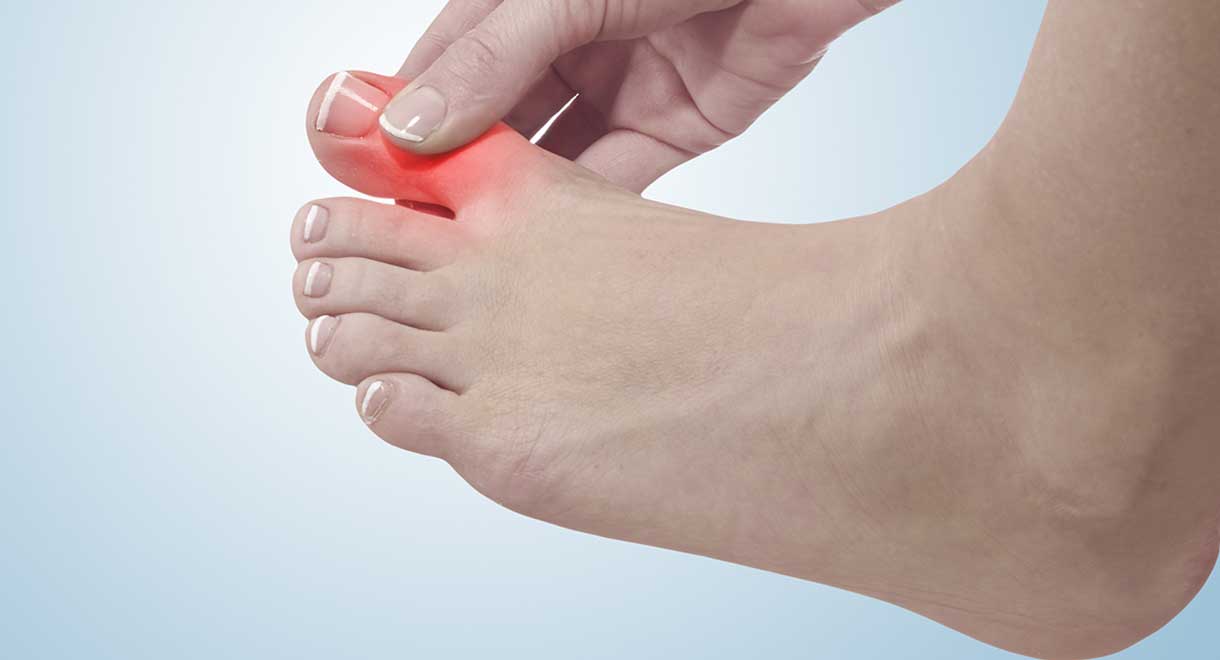Gout
Gout is a form of arthritis in which uric acid, a metabolic waste product, appears in excessive quantities in the bloodstream and may be deposited in the joints and tissues. Gout is associated with inflammation, swelling and extreme pain in a joint/s during an attack. In 90% of acute gout cases, the most common site will be the big toe. Gout may also affect feet and ankles.
These attacks can last days or even weeks and not return for many months or years. If symptoms are not addressed, over time a state of chronic joint inflammation may develop into progressive cartilage and bone damage.
What causes gout?
Gout often develops in those who have a build up of uric acid. Usually, it is dissolved in the bloodstream and filtered by the kidneys and excreted in urine. Uric acid forms (as crystals) then settles into the joints often causing inflammation, redness and/or swelling. It is more common in men than women; however, women are at a greater risk after menopause.
Causes of gout can include; inherited tendencies, a side effect of chemotherapy, impairment of clearance due to the anti-hypertensive drugs, high intake of alcohol, high intake of sugar, carbohydrate and caffeine; high intake of foods containing purines (organ meats, sardines etc), some kidney diseases and those with the metabolic condition known as Syndrome X, or diabetes.
How do you treat gout?
Treating gout is very easy and should begin with changing one’s diet. Healthy lifestyle choices are important with the correct eating program to rid the excess levels of uric acid.
- See “I can’t lose weight! …and I don’t know why” and follow the eating regime outlined in the book. Maintaining ideal weight is important. So, if overweight, stay on Stage 1 in this book until you reach your ideal weight.
- Ensure you drink 8 to 10 glasses of water each day.
- Aim for moderate regular exercise. Consult with your healthcare physician first if you have injuries.
- Aim for more alkaline foods such as fresh vegetables and fruit. Cherries and other dark berries will help to lower uric acid. Celery also helps the body excrete uric acid.
- Avoid or limit acidic foods such as alcohol, coffee, gluten, sugar and high fruit consumption. Restrict organ meats and sardines during a gout attack.
Is there a test to measure levels of uric acid?
Yes. This blood test measures the amount of uric acid in the blood. Normal uric acid levels can be found on page 45 of the Syndrome X book.
|
MALES
|
3.4 TO 6.7 (blood levels)
|
|
FEMALES
|
1.7 TO 5.0 (blood levels)
|
|
URINE LEVELS
|
302 to 672 mg per 24 hours
(in a 24 hr collection sample of urine)
|
Raw juicing
Raw juice daily if possible and use any or all of the following: celery, carrot, garlic, parsley, grapefruit, pineapple and cucumber. See “Raw Juices Can Save Your Life” for other recipes to help reduce pain. Raw juices can be diluted with water if desired.
Conventional treatment
- Non-steroidal anti-inflammatory drugs (NSAIDs) to help reduce pain and swelling
- Corticosteroids
Recommended supplements for gout
- Serrapeptase
Take 2 – 3 capsules per day on an empty stomach. Serrapeptase has a natural anti-inflammatory effect. It helps to clean up cellular debris in the body and can help to reduce joint pain and swelling. - Joint EZE
Take 1 – 2 capsules, two times daily with meals. Bone and joint formulas help assist in the reduction of pain, inflammation and swelling associated with arthritic symptoms such as gout. - Fish Oil
Take daily with meals – supplementing with fish oil may help to reduce inflammation. - Vitamin E
Take 2 capsules daily with food. Several studies suggest its important role in the metabolism of fats in the arterial wall. Vitamin E is a powerful antioxidant. Each capsule contains 400 I.U. of natural vitamin E.
The above statements have not been evaluated by the FDA and are not intended to diagnose, treat or cure any disease.


Leave A Comment